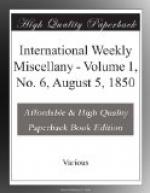“While at Copenhagen, he secured, in an eminent degree, the esteem and confidence of the Danish authorities, and brought to a successful solution the questions then arising out of the interests committed to him. In consequence, the government was enabled to avail itself of his experience at the Court of Berlin, where events seemed to require the exercise of great diplomatic ability. He was afterward appointed to Madrid, where, by his highly honorable personal character, and captivating manners, he obtained great influence, even at that most proud and distrustful court, and conducted, with consummate skill and marked success, the important and delicate negotiations then pending between the United States and Spain. He remained at Madrid for many years, where he attained the reputation of being one of the most able and accomplished diplomatists that the United States had ever sent abroad. Upon his final retirement from this post, and, in fact, from all public employment, the administration of General Jackson sought to secure his services in the mission to Constantinople, but the proffered appointment was declined.
“There are many interesting incidents in his public and diplomatic career, which a more extended notice would enable us to detail. Indeed, we hope that so instructive a life as that of Mr. Erving may hereafter find a fit historian. That historian may not have to chronicle victories won upon the battle field, but the civic achievement he will have to record, if not so dazzling as the former, will, at least, be as replete with evidences of public usefulness.
“The latter years of his life were passed in Europe, chiefly in Paris. The public agitations consequent upon the last French revolution, need of quiet at his advanced age, and the presentiment of approaching dissolution, induced him to return home. Indeed it was meet that he should close his mortal career in that country which he had so long and faithfully served, and whose welfare and happiness had been the constant object of his every earthly aspiration.”
* * * * *
DR. JOHN BURNS.
Among those who perished in the wreck of the Orion, was Dr. John Burns, Professor of Surgery in the University of Glasgow, aged about eighty years. Dr. Burns held a distinguished place in the medical world, for at least half a century, as an author and a teacher. He was a son of the Rev. Dr. John Burns, for more than sixty years minister of the Barony parish of Glasgow, who died about fourteen years ago, at the age of ninety. He was originally intended to be a manufacturer, and in his time the necessary training for this business included a practical application to the loom. A disease of the knee-joint unfitted him for becoming a weaver, and he turned his attention to the medical profession, winch the neighboring university afforded him easy and ample means of studying. He early entered into business as a general practitioner,




